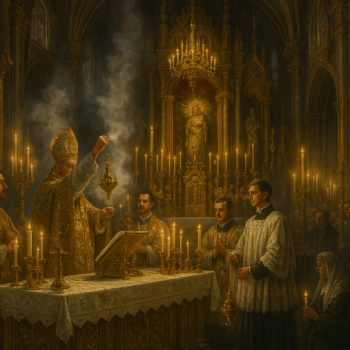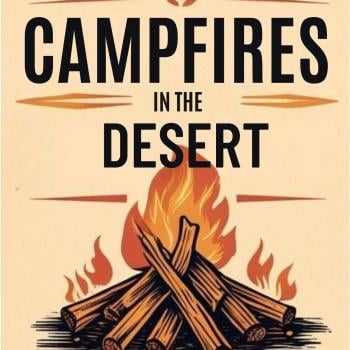As Easter comes around each year, I think of Easters celebrated at sea on Navy warships. I was usually, given my profession, on an aircraft carrier. Attending a sunrise service in khakis and "boondockers" (boots), on a flight deck steeped in the odors of jet fuel and brine, is a pungent reminder of the meaning of the resurrection: that God is in us wherever we are, and there is no place we cannot be consecrated to Him.
My last Easter at sea was on April 20, 2003. We were in the Persian Gulf conducting Operation Iraqi Freedom. Baghdad had fallen eleven days before; our aircraft patrolled the skies of an Iraq in chaos. The sunrise services on the flight deck—one Catholic, one Protestant—were conducted with dispatch, because the deck had to be readied for the flight operations that would start later in the day. As we sang the best-known Easter hymns from memory, our voices seemed to rise and dissipate over the Gulf with the early morning haze.
It was not until years later that I found this piece by Episcopal minister Timothy Nakayama, and became aware of the odd coincidence that America's two ground invasions of Iraq occurred at the same time on the Lenten calendar in both 1991 and 2003. Reverend Nakayama's article goes on to describe the peculiar correlation, in 1945, of liturgical dates with the events of World War II. The Battle of Okinawa, in which more than 160,000 Allied and Japanese troops died, started on Easter Sunday (April 1). And the first atomic bomb was dropped on Hiroshima on August 6, the liturgical date for the Feast of the Transfiguration.
There is always human activity surrounding Easter, of course—sometimes related to the Holy Day, often not. Abraham Lincoln was shot on Good Friday in 1865 and died on Holy Saturday. Two 20th-century military actions are commemorated as "Easter Offensives": the final, desperate attack by Germany's forces in World War I, in the spring of 1918, and the major offensive of the North Vietnamese Army in 1972, its last before the Paris Peace Treaty was signed in early 1973.
The 20th century also saw the "Easter Rebellion" of the Irish against British rule in 1916; the infamous "Ludlow Massacre" of 1914, in which striking mine workers and their families in Colorado were killed on Easter night; and the "Easter Sunday Massacre" of 1975 in Hamilton, Ohio, in which a man slew eleven members of his family. Sadly, the century was not yet done with Easter Sunday Massacres; another one was perpetrated by the government of Cambodia in 1997.
Yet not all the Eastertide news has been bad. In a widely circulated Commonweal article from 1993, Paul Baumann recounted how his Jewish relatives chose Easter weekend, 1944, for their escape from Poland before the advancing the Red Army. Baumann's father-in-law explained, "We thought it would be a wonderful time to leave . . . because [Poles and Germans] would be in a festive mood."
Holy Week did not go so well the following year, however. On the eve of Palm Sunday, 1945, an elite group of Germans and Austrians launched the "Rechnitz Massacre" as part of the festivities at a weekend party. Over a two-day period, in one of the ghastliest incidents of the Nazis' final weeks in power, the drunken revelers killed more than 180 Hungarian Jewish slave laborers who had been delivered to them for sport.
A superb piece last week by Eric Metaxas, biographer of Dietrich Bonhoeffer, puts this unspeakable horror in poignant perspective. Two weeks after the Rechnitz Massacre, Bonhoeffer was hanged by the Nazi regime on April 9, 1945. "By all accounts," Metaxas writes, "Bonhoeffer went to his death with the peace of God, with no regrets." Reportedly, Bonhoeffer's last words were, "This is the end. But for me, the beginning of life."
Adolf Hitler, by contrast, was a prey to anxiety and terrors during this period, sequestered in his bunker and knowing he had no hope and no future. He had to be sedated to participate in the celebration of his 56th birthday on April 20—a painful echo of his officers' crazed intoxication in Rechnitz, Austria the previous month. He shot himself on April 30; his successor surrendered to the Allies on May 8.





